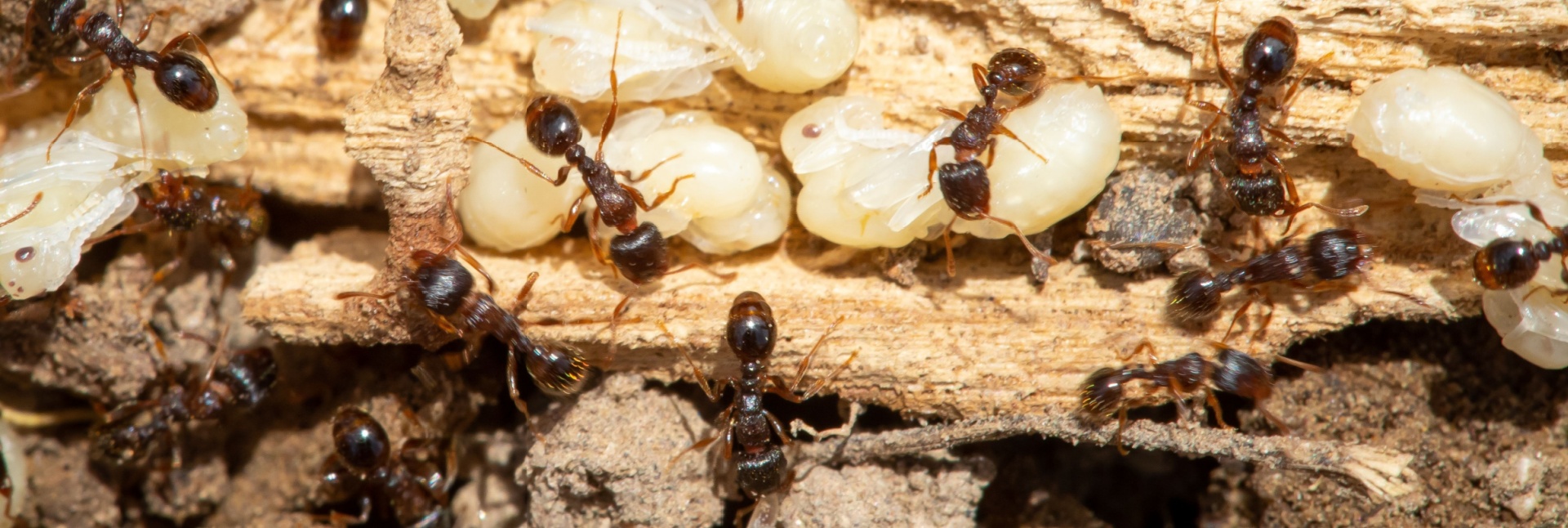The Hidden Dangers of Ant Infestations: More Than Just a Nuisance

Ants are often dismissed as harmless household visitors—tiny, persistent, and mildly disruptive. But beneath their orderly trails and industrious behavior lies a much larger problem. Ant infestations can quietly escalate into serious threats to your home, health, and food supply.
Here are some of the most overlooked but serious risks that come with letting an ant problem go unchecked:
The Silent Saboteurs: Property Damage You Didn’t See Coming
Structural integrity isn’t something most homeowners associate with ant activity—but it should be. Carpenter ants, in particular, burrow through wood to build their nests, weakening beams, joists, and other foundational elements. Over time, this hidden damage can compromise safety and lead to expensive repairs.
In South Carolina’s humid climate, moisture-damaged wood is common, making homes especially vulnerable to these silent invaders. Their ability to nest deep within walls or crawl spaces means the problem often goes unnoticed until it’s advanced.
Contaminated Kitchens and Compromised Health
Food safety takes a hit when pests begin to infiltrate storage areas. Ants are known to travel through unsanitary environments before reaching your countertops and pantry, bringing bacteria and pathogens along for the ride.
Pharaoh ants, for example, have been linked to the spread of salmonella and other harmful organisms. For families with young children, elderly members, or anyone with a weakened immune system, this contamination poses a serious health risk.
Allergies, Bites, and Unexpected Reactions
Not all ant encounters are harmless. Some species bite or sting, triggering allergic reactions that range from mild irritation to severe swelling. Fire ants are especially aggressive and can pose a threat in outdoor areas where people and pets gather.
Even species that don’t bite can still cause problems. Their nesting materials, droppings, and shed skin may aggravate respiratory conditions or skin sensitivities, particularly in homes with allergy-prone residents.
Electrical Hazards: Ants and Your Wiring
Few homeowners realize that electrical systems can attract pests. Certain ant species are drawn to the warmth and vibration of electrical currents, leading them to invade outlets, circuit breakers, and HVAC units.
Once inside, they can cause corrosion, short circuits, and even fire hazards. In older homes or high-humidity environments, this risk increases significantly. If appliances begin malfunctioning or fuse boxes spark unexpectedly, hidden ant activity could be the culprit.
Routine inspections of electrical panels and outdoor units can help catch early signs of infestation before serious damage occurs.
Garden and Landscape Destruction
Outdoor spaces aren’t immune to pest-related damage. Infestations in gardens and lawns can disrupt root systems, degrade soil quality, and encourage the spread of other harmful insects.
One of the most destructive partnerships in nature is between ants and aphids. Ants protect aphids in exchange for their sugary secretions, allowing aphid populations to explode unchecked. This leads to nutrient loss in plants, stunted growth, and widespread disease.
In addition, ant mounds can ruin the appearance and safety of your yard. Raised soil and aggressive species like fire ants make outdoor areas hazardous for children and pets.
Pet Safety and Food Contamination
Your pets aren’t exempt from the risks of infestation. Food and water bowls left out can quickly become targets, drawing in ants that contaminate supplies and potentially bite or sting your animals.
Contaminated pet food can lead to digestive issues or exposure to harmful bacteria. In multi-pet households, this problem can escalate quickly, creating stress for both animals and owners. Ants may also invade bedding, litter boxes, or kennels, turning safe spaces into sources of irritation.
Keeping feeding areas clean helps, but once ants establish a trail, they’ll keep coming back until the colony is eliminated.
The Complexity of Ant Colonies: Why Infestations Escalate Quickly
What makes ant infestations so persistent is their sophisticated colony structure. Many species operate with satellite nests that support a central hub, allowing them to spread across multiple areas of a property while remaining connected.
These colonies can contain tens of thousands of individuals, all working in coordination. The queen, hidden deep within the nest, continues to reproduce while workers forage and expand territory. This decentralized system makes infestations resilient and difficult to eliminate without a strategic, species-specific approach.
Understanding colony behavior is essential to breaking the cycle and preventing future outbreaks.
When Ants Cross the Line from Nuisance to Threat
The impact of an ant infestation isn’t limited to what you see—it runs deeper, affecting the safety, stability, and hygiene of your home. Whether it’s hidden damage in your walls or health risks in your kitchen, these issues call for more than a casual fix.
If any of the following situations sound familiar, it’s time to take action:
- Wood damage or moisture-prone areas showing signs of carpenter ant activity
- Food contamination or recurring kitchen invasions, even after cleaning
- Unusual behavior in pets, including bites, stress, or avoidance of feeding areas
- Electrical malfunctions or ants near outlets and appliances
- Visible mounds or disturbed soil in gardens, lawns, or play areas
- Multiple rooms affected, suggesting a network of satellite colonies
- Allergic reactions or stings experienced by family members or guests
Team Veterans Pest Control provides professional ant removal services in South Carolina that directly address the serious risks—from structural damage and electrical hazards to food contamination and pet safety. With a commitment to precision and long-term protection, our team delivers targeted solutions that eliminate colonies at their source and prevent future infestations. Whether you’re in Charleston, Myrtle Beach, or Columbia, we treat every home with the same care and attention we’d give our own—because protecting your family is what drives everything we do.
The longer ants stay, the deeper the damage. Reach out now and let Team Veterans Pest Control stop it at the source.